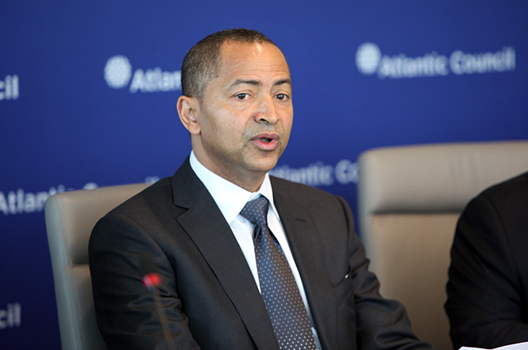 Moïse Katumbi, a prominent opposition leader from the Democratic Republic of the Congo (DRC), will return to the country to continue the fight for the first peaceful, democratic transition in its history.
Moïse Katumbi, a prominent opposition leader from the Democratic Republic of the Congo (DRC), will return to the country to continue the fight for the first peaceful, democratic transition in its history.
“My heart is with the Congolese people,” Katumbi said on February 16 at a meeting hosted by the Atlantic Council’s Africa Center. “I look forward to returning to my country and working toward our first democratic transition and the establishment of enduring democracy, prosperity, and peace in the Democratic Republic of the Congo.”
In May of 2016, after emerging as a presidential hopeful, Katumbi was charged with hiring foreign mercenaries and plotting against Congolese President Joseph Kabila, at which point he left the country.
“As I joined them in pressing for free and fair elections, I was effectively forced into exile,” said Katumbi, a former governor of Katanga province.
“However,” he said, “I have always vowed to return, and now is the time.”
Katumbi and other members of the political opposition in the DRC are working to ensure the country conducts democratic presidential elections, “free from intimidation and harassment,” before the end of 2017. “For the first time in years, we have a framework that will allow this to happen,” said Katumbi.
Kabila’s constitutionally mandated two terms as president expired on December 19, 2016, yet he refused to relinquish power. To prevent chaos and violence, the National Episcopal Conference of Congo (CENCO), a group of Roman Catholic bishops, brokered an agreement among all stakeholders that provisionally extends Kabila’s time in office to the end of 2017. Until then, the political opposition will work to form a transitional government and organize elections. A prime minister, chosen by the opposition, will lead the government during this time. The agreement “provided a path out of a political crisis and into a brighter future,” said Katumbi.
Negotiations to create this transitional government, select a prime minister, and decide on an election date remain ongoing. However, Katumbi said he was confident that “participants in that process will achieve a consensus that helps unify our country.”
In the meantime, violence and corruption have continued. According to Katumbi, “too many people have lost their lives so that democracy will live.”
Katumbi’s decision to return to the DRC at this time places him at great personal risk. CENCO is now conducting an investigation into the charges levelled against him in 2016, and will soon deliver a verdict.
“I fully expect I will be exonerated,” said Katumbi. He said: “The charges were bogus. The evidence was fabricated. The conviction was a miscarriage of justice—the pollution of our court system by politics.”
However, he added, “in the unlikely case that CENCO affirms the conviction then I will accept that decision and relinquish my freedom. The agreement must be honored.” By returning to the DRC, Katumbi is acting in good faith, throwing his full support behind the authority of the CENCO agreement.
Katumbi said he will abide by the ruling of the accord, and he expects Kabila to act in turn. “Once I am exonerated—as I trust I will be—I expect President Kabila to honor the agreement as well,” he said, equating his sentencing with Kabila’s presidency. He said both are legitimized by the CENCO agreement, and both he and Kabila must respect the stipulations of the deal. According to Katumbi, “the legitimacy of [Kabila’s] extended presidency depends solely on the terms of the agreement being honored. If the agreement is breached by Kabila and no longer in effect, his legitimacy instantly fails.”
In an interview with Julian Wyss, assistant director of the Atlantic Council’s Africa Center, on February 16, Katumbi said he will return to the DRC bearing the body of Etienne Tshesekedi, the leader of the Union for Democracy and Social Progress, the primary opposition party to Kabila’s government. Tshesekedi passed away on February 2. Katumbi described him as a “big brother in this honorable struggle.”
Though Tshesekedi was a leader in the negotiations to establish a transitional government, “that process continues despite [his] death,” said Katumbi.
Calling for the continued efforts of opposition leaders and peaceful activists, Katumbi said: “Peace and stability can emerge only when our nation is governed by leaders chosen in free and fair elections and with mutual trust.”
Rachel Ansley is an editorial assistant at the Atlantic Council.
Image: “My heart is with the Congolese people,” Moïse Katumbi, a prominent opposition leader from the Democratic Republic of the Congo (DRC), said on February 16 at the Atlantic Council. “I have always vowed to return, and now is the time.” (Atlantic Council/Victoria Langton)
